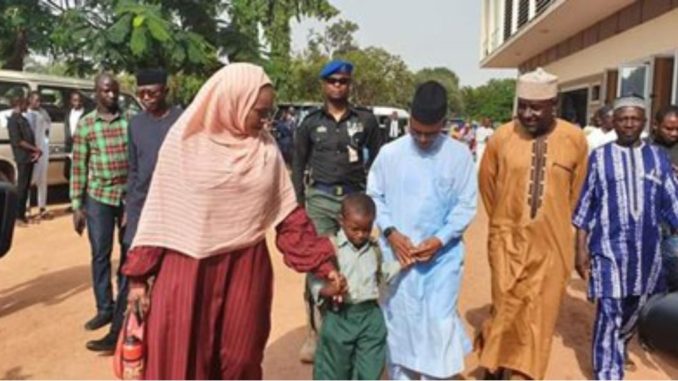
It was an audacious pronouncement. In a state broadcast in December, 2017, the Kaduna State Governor, Mallam Nasir el-Rufai, had made a pledge to the people of the state that “I will by personal example ensure that my son that will be six years old in 2019 will be enrolled in a public school in Kaduna State by God’s grace.” The governor urged other public officers in the state to do likewise to demonstrate his administration’s determination and sincere commitment “to fix public education and raise their standards so that private education will become only a luxury”.
This week, Governor el-Rufai proved that his promise was not just the empty rhetoric often associated with politicians. In an unusual and commendable move, he has enrolled his son, Abubakar, Al-Saddique el-Rufai in primary one at the Capital School, Malali, Kaduna State. Some cynics have referred sarcastically to the fanfare that attended young Abubakar el-Rufai’s going to school with all the media hype it attracted in comparison to other less privileged children who started school across the state in relative anonymity.
Well, the child of the first citizen of the state can surely not be registered to commence his primary education in a public school, a practice against the prevalent norm, without attracting considerable attention. This is returning to the example of statesmen like Chief Obafemi Awolowo and Alhaji Lateef Jakande, in the first and second republics, respectively, whose children attended public schools even when their fathers held high political offices.
Even then, that was a period when there was still a lot of confidence in public schools and they compared favourably with private ones. Given the level of gross deterioration of public education at all levels in contemporary Nigeria, el-Rufai’s example is a remarkable and refreshing one.
The el-Rufai administration in Kaduna State has taken commendable steps to re-position education in the state and transform the sector into an efficient and effective vehicle for achieving rapid development. Sometimes it has had to take courageous but painful decisions in this regard. For instance, the administration introduced proficiency tests for primary school teachers and had no option but to weed out those who were patently ill-equipped to impart qualitative education to pupils. In their place, 25,000 new qualified teachers were recruited to raise the quality of instruction in primary schools, the foundational level of education.
In recognition of the critical role of education in extricating the state from debilitating poverty and underdevelopment, the el-Rufai administration declared the first nine years of schooling free for boys and the whole 12 years of primary and secondary education free for girls, thus doubling school enrolment from 1.1 million to nearly 2.1 million in the state. And through the Kaduna State Universal Education Board, the government has embarked on a massive school rehabilitation programme with humongous funds committed to the provision of modern classrooms, furniture, water, and toilet facilities.
About 1,069, 140 pupils from primary one to primary three in 3,922 primary schools are also benefitting from the state’s school feeding programme at the cost of N70/child a day. This has impacted positively both on school enrolment numbers and the healthy growth of school children who are fed daily nutritious meals. Governor el-Rufai’s enrolment of his son in a public school demonstrates that his administration’s huge investment in the sector is no fluke. After all, the governor would not want his child to receive substandard education.
Some critics contend that el –Rufai is only playing to the gallery and seeking publicity for the sake of politics. Whatever may be his motives, this is a salutary example of leadership worth emulating. If more prominent public officers follow in this path, governments would care more both for the quality of public education and the safety of pupils who attend them.
END

Be the first to comment